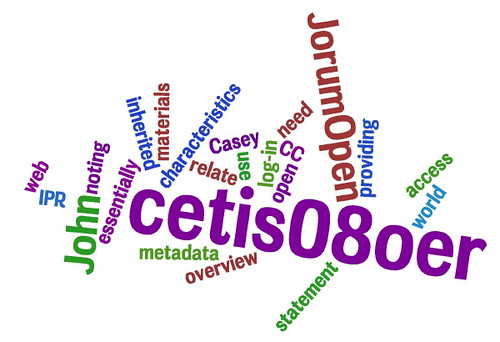Following the experimental nature of the HEFCE / Academy / JISC Open Educational Resources call JISC are adopting a somewhat experimental approach to technical infrastructure for this programme. Although the ultimate aim of the OER Programme is to change process and practice at the institutional level the catalyst for making this happen is opening access to educational resources. Or in other words, getting content out onto the open web.
Metadata
Although JISC will provide projects with technical advice and guidelines the OER Programme will not mandate the use of one single platform to disseminate resources and one single metadata application profile to describe content. However projects will need to ensure that content released through the programme can be found, used, analysed, aggregated and tagged. In order to facilitate this, content will have to be accompanied by some form of metadata. In this instance metadata doesn’t necessarily mean de jure standards, application profiles, formal structured records, cataloging rules, subject classifications, controlled vocabularies and web forms. Metadata can also take the form of tags added to resources in applications such as flickr and YouTube, time and date information automatically added by services such as slideshare, and author name, affiliation and other details added from user profiles when resources are uploaded. Consequently the OER Programme will only mandate the following “metadata”:
- Programme tag
ukoer - Title
- Author / owner / contributor (from user profile)
- Date
- URL
- Technical info – file format, name & size
The first two will have to be created manually but projects are strongly encouraged to use platforms and systems that can generate or accommodate the rest.
Projects are also encouraged to think about providing additional information that will help people to find and access resources. For example:
- Language information
- Subject classifications
- Keywords
- Tags
- Comments
- Descriptions
Delivery Platforms
Projects are free to use any system or application as long as it is capable of delivering content freely on the open web. However all projects must also deposit their content in JorumOpen. In addition projects should use platforms that are capable of generating RSS/Atom feeds, particularly for collections of resources e.g. YouTube channels. Although this programme is not about technical development projects are encouraged to make the most of the functionality provided by their chosen delivery platforms.
Content Standards
The OER Programme is expected to generate a wide range of content types so mandating specific content standards is impractical. However Projects should consider using appropriate standards for sharing complex objects e.g. IMS Content Packaging IMS Common Cartridge and IMS QTI for assessment items. OAI ORE may also be of value although I’m not aware of any previous implementations focused specifically on teaching and learning materials, please correct me if I’m wrong however!
What We Hope To Learn
As this is a pilot programme there are many areas where we are seeking to learn more about approaches are likely to be beneficial to the community. These include:
- Improving institutional and individual workflows for managing content
- Limitations and benefits of different file formats for OERs
- Limitations and benefits of different platforms for OER sharing
- Search engine optimisation and resource discovery mechanisms such as bookmarking and tagging
- Persistent identifiers and version-handling for OERs. See Phil Barker’s excellent recent post on this particularly thorny topic.
- How to track usage and impact of OERs
The OER Programme hopes to encourage projects to share their successes, failures, ideas, requirements, opportunities and good practices, and above all to be bold, innovative and experimental!
This post is based on a presentation written and presented by Amber Thomas of JISC and I at the recent HEFCE / Academy / JISC Open Educational Resources Community Briefing day. The original presentation is available from the JISC IE Repository at http://ie-repository.jisc.ac.uk/280/
